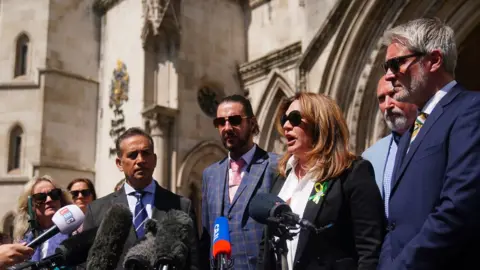Nottingham attacks killer's sentence should include jail, court told
 BBC
BBCA man who stabbed three people to death in Nottingham should have his sentence changed to include a jail term, appeal judges have heard.
Valdo Calocane killed Barnaby Webber and Grace O'Malley-Kumar, both 19, and 65-year-old Ian Coates in June 2023.
He was given a hospital order after admitting manslaughter on the basis of diminished responsibility.
Lawyers told the Court of Appeal Calocane should be given a life term as part of a "hybrid order".
In addition to killing Mr Webber, Ms O'Malley-Kumar and Mr Coates, Calocane stole Mr Coates's van and used it to drive at three pedestrians, who were all left seriously injured.
Calocane's sentence was deemed unduly lenient by the attorney general, who referred it to the court.
 Nottinghamshire Police
Nottinghamshire PoliceOn Wednesday, Calocane - who had been diagnosed with paranoid schizophrenia before the attacks - appeared in court via video link from Ashworth high-security hospital near Liverpool.
Deanna Heer KC, representing the attorney general's office, said Calocane should have received a hospital and limitation direction - referred to in court as a "hybrid order" - where he would be treated in hospital before being transferred to prison.
While not criticising the approach of the original sentencing judge, she said psychiatrists who gave evidence to the court had not commented on the need for custodial action.
"Their assessments did not include the need for punishment or a penal element, which was meant for the sentencing judge," she said.
"The exceptional level of seriousness of the offences was such that the case required the imposition of a sentence with a penal element, an element of punishment."
Pointing to Calocane bringing knives to the scene of the attacks and also using a vehicle as a weapon, Ms Heer said the "significant degree of planning and premeditation" showed the risk he presented to members of the public.
"He acted deliberately and with the intent to kill," she said.
Peter Joyce KC, representing Calocane, told the court the defendant's mental illness was the central feature of the attacks.
"But for the psychosis, these offences - none of them - would have been committed," he said.
"He was stricken by this dreadful condition through absolutely no fault of his own."
Describing Calocane as "a hard-working man who had got himself through university", Mr Joyce said the illness was still affecting him, including hearing voices he felt were controlling him.
"The voices are gloating at the trouble they have got him into here," he said. "They're pleased at the result of the effect that they had on him."
Noting how psychiatrists agreed Calocane is "likely to spend the remainder of his days" in a hospital, Mr Joyce said it would be "wrong" if he was "to be punished for being mentally ill".
"He is never likely to see the light of day again," he said.
"The question we pose is: How can that possibly be an unduly lenient sentence in anyone's parlance?"
 PA Media
PA MediaLady Chief Justice Baroness Carr said she and her two fellow judges would retire to consider their judgement.
She said a decision was expected to be made in about seven days.
"Obviously we recognise how extremely distressing this case is for all concerned," she added.
Speaking after the hearing, the victims' families said the hearing was an "ongoing part of the struggle" for justice.
Emma Webber, mother of Mr Webber, said they were "grateful" to the attorney general for referring the case.
"Next week we will finally get some sort of answer but it is not closure, it is not a full stop," she said.
Ms O'Malley-Kumar's father, Sanjoy Kumar, said the families still wanted a public inquiry to look into the "long list of people [and] organisations that failed us".
"It's very, very hard for all of us to go through this process when all we should be doing is grieving," he said.
"We will fight all of the organisations that failed us."

At the scene
By Dominic Casciani, BBC home and legal correspondent at the Court of Appeal
Calocane is detained under the strictest form of mental health hospital order, meaning he is unlikely to ever be freed.
The Court of Appeal heard submissions that Calocane's sentence had been "unduly lenient", and should have included the possibility of transferring him to jail, if he ever became well enough to leave hospital.
That challenge relates to evidence that while Calocane was chronically ill, he had been able to plan his attacks.
During the hearing, Ms Heer accepted that all of the doctors who had evaluated Calocane had favoured a hospital order because they concluded it would ensure he remained on medication.
There is no secure hospital equivalent of a whole-life prison sentence. That means that the killer could one day argue he is cured and ask a special tribunal to consider releasing him.

Follow BBC Nottingham on Facebook, on X, or on Instagram. Send your story ideas to [email protected] or via WhatsApp on 0808 100 2210.
